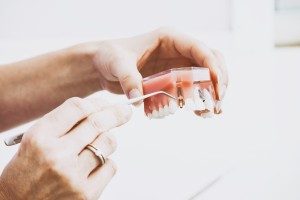When you choose Classic Denture Center in Portland OR, you can be certain you are in good hands. Your new dentures will be handcrafted to fit your oral and confidence needs, giving you a comfortable and beautiful smile each and every day.
Once you take your new dentures home, it will be up to you to keep them looking and functioning great for as many years as possible. One of the factors for good retention of complete dentures is good coats of healthy saliva in the mouth. That said, we see many patients who have a dry mouth condition called xerostomia, often caused by a lack of saliva.
The function of your saliva is to coat and moisten the tissue inside your mouth. When this tissue gets too dry, it can become irritated, causing soreness and sometimes even infections. Without good saliva flow to keep your mouth clean, tooth decay and gum disease can be much more common.
Dry mouth can lead to problems such as cavities and bad breath, but also lead to:
- Trouble with tasting, swallowing, chewing or speaking
- Burning feeling in your mouth
- Dryness in your throat
- Cracked lips
- Dry and rough tongue
Another problem we see with patients suffering from dry mouth is less comfort when wearing full dentures. This happens because the thin film of saliva necessary to help the dentures hold on well to oral tissue is simply not present.
Causes of Dry Mouth
 The most common precursor to dry mouth is taking medications to treat other problems. Many prescriptions (over 400) and over-the-counter medications list dry mouth as a side effect.
The most common precursor to dry mouth is taking medications to treat other problems. Many prescriptions (over 400) and over-the-counter medications list dry mouth as a side effect.
Some of these include:
- Medicines for allergies, colds and high blood pressure
- Painkillers
- Antidepressants
In order to combat this issue, it is important to read the drug inserts that come with your medications. In the case where dry mouth is listed as a side effect, it is a good idea to let your dentist, denturist, hygienist or physician know so you can discuss your options. You may be able to take a different medication and avoid xerostomia all together.
Other than medication, dry mouth has also been known to be caused by other factors, including:
- Radiation treatment for head and neck cancers
- Salivary gland disease (such as Sjogren syndrome)
- Emotional stress
- Chemotherapy
Dry Mouth Relief
 There are many things you can do to improve your xerostomia, including something as simple as drinking more fluids.
There are many things you can do to improve your xerostomia, including something as simple as drinking more fluids.
Other ways to manage dry mouth include:
- Chewing sugar-free gum or sucking sugar-free hard candy to increase saliva flow
- Sipping water with meals to moisten dry food
- Sucking on ice chips during the day
- Keeping the air moist with a humidifier at your bedside or another place in your home
- Using over-the-counter saliva tablets to increase saliva flow
- Applying a lanolin-based ointment to dry lips
- Sipping water often
- Using alcohol-free mouthwash
- Avoiding caffeine, alcohol, tobacco and carbonated drinks
One of the most important things you can do if you are suffering from dry mouth is to make sure to see your dentist or denturist regularly, and always let them know about any medicines you may be taking and any other health-related issues.
Classic Denture Center in Portland Oregon is owned and operated by Tanya Poleon L.D. Tanya is highly dedicated to giving you comfort and confidence through your smile and can help you achieve all of your denture related goals. Contact us for help with your dentures today!







